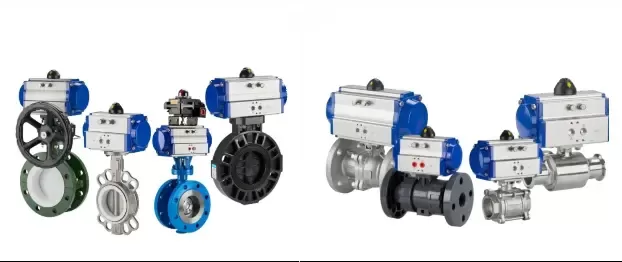Notifications

3 minutes, 52 seconds
-346 Views 0 Comments 0 Likes 0 Reviews

As a leading control valve manufacturer in China, we deliver high-quality valves and control actuators expertly designed to meet a wide range of industrial applications.
Control valves are vital components in industrial systems, regulating parameters such as pressure, temperature, and flow rate to ensure efficient, precise, and reliable operation. By adjusting the size of the flow passage, these valves control fluid movement—whether gases, liquids, or steam—through pipelines and process systems. Often paired with actuators responding to control signals, they maintain desired process conditions that optimize safety and performance.
Control valves modulate fluid flow to maintain specific conditions like pressure, flow rate, or temperature, through a feedback loop involving sensors, controllers, and actuators:
Data Collection by Sensors: Sensors measure real-time variables (pressure, flow, temperature) and send data to the control system.
Control System Processing: The control system (DCS or PLC) compares sensor data to preset target values (set points) and determines corrective actions if deviations occur.
Signal Transmission: Depending on the actuator type, signals to adjust the valve are sent manually, pneumatically, electrically, or hydraulically.
Valve Adjustment: The actuator moves the valve stem to open or close the flow passage, regulating the fluid accordingly.
Continuous Feedback: The system continuously monitors and fine-tunes valve position to maintain stable process conditions.
Globe Valves: Offer precise flow control, suitable for frequent adjustments.
Ball Valves: Provide quick shut-off, ideal for on/off high-pressure applications.
Butterfly Valves: Compact design for large flow in low-pressure systems.
Diaphragm Valves: Used in corrosive or abrasive fluid environments.
Plug Valves: Deliver tight shut-off with moderate flow control.
Control valves find use in many industries, including:
Oil and Gas: Flow regulation in pipelines and refineries.
Power Generation: Managing steam and cooling systems.
Chemical Processing: Maintaining reactor and distillation conditions.
Water Treatment: Controlling filtration and distribution.
Pharmaceuticals: Accurate dosing and mixing processes.
Precision: Enables accurate control of process variables.
Efficiency: Optimizes energy use and minimizes waste.
Reliability: Consistent operation through advanced feedback.
Versatility: Adaptable across many industrial settings.
Cavitation & Flashing: Vaporization damage from pressure drops.
Erosion & Corrosion: Wear from harsh fluids or conditions.
Actuator Failure: Requires regular maintenance to prevent disruptions.
Complexity: Demands skilled personnel for operation and troubleshooting.
Control valves are indispensable for modern industrial automation, ensuring processes run safely and efficiently through precise regulation of flow, pressure, and temperature. Understanding their working principle and choosing the right valve type are essential for optimal system performance. Continued technological advances promise smarter, more effective control solutions, reinforcing the valve’s role in achieving operational excellence across industries.
Investing in quality control valves and following best maintenance practices leads to improved efficiency, reliability, and cost savings in critical industrial processes.Know more about Google SEO Directory

